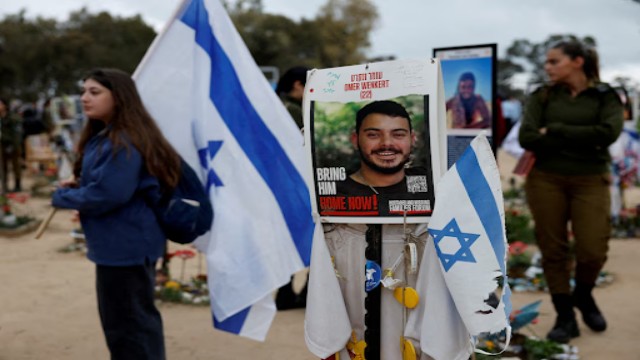
People walk past a poster of hostage Omer Wenkert at the Nova festival site in Reim, southern Israel, where Hamas gunmen attacked on October 7. REUTERS
Israel is getting ready to receive six more hostages from Gaza. These individuals are being released as part of a deal in exchange for hundreds of Palestinian prisoners. However, the agreement has faced complications, especially after Hamas returned the wrong body earlier this week.
The six hostages are the last of a group of 33 who were set to be freed in the first phase of the ceasefire agreement. According to Hamas officials, they are expected to be released around 8:30 a.m. on Saturday.
Among them are four hostages—Eliya Cohen, 27, Tal Shoham, 40, Omer Shem Tov, 22, and Omer Wenkert, 23—who were taken by Hamas on October 7, 2023. The other two, Hisham Al-Sayed, 36, and Avera Mengistu, 39, have been held by Hamas for about a decade after they separately entered Gaza under unclear circumstances.
As part of the exchange, Israel is set to release 602 Palestinian prisoners. The swap has continued despite various challenges that nearly caused it to collapse multiple times.
Tensions rose on Thursday when Israel accused Hamas of violating the ceasefire by returning an unidentified body instead of the remains of Shiri Bibas. Hamas claimed her remains got mixed with others after an Israeli airstrike in November 2023. On Friday, the group handed over another body, which Israeli forensic teams are now identifying.
The Bibas family became a symbol of Israel’s suffering after they were kidnapped during Hamas’s attack on October 7. The Israeli military says intelligence and forensic reports show that Bibas’s two young sons, 10-month-old Kfir and four-year-old Ariel, were deliberately killed by their captors.
Prime Minister Benjamin Netanyahu vowed that Hamas would "pay the full price" for not returning Bibas’s body. However, he decided not to end the ceasefire agreement, which has been in place since January 19.
Hamas has accused Israel of violating the ceasefire by blocking essential aid from entering Gaza. Despite the accusations, the group has formally notified Israel of the six hostages set for release, confirming the exchange is moving forward.
While the ceasefire has brought temporary peace, a permanent resolution remains uncertain. Hamas killed about 1,200 people and took 251 hostages during its October 7 attack on Israel. Meanwhile, Israel’s military campaign in Gaza has reportedly killed at least 48,000 people, according to Palestinian health officials. The war has also left large parts of Gaza in ruins, with hundreds of thousands now living in makeshift shelters and relying on aid.
Both sides have agreed to discuss a second phase of the deal. This would involve the return of about 60 more hostages and the withdrawal of Israeli troops from Gaza. However, disagreements over Gaza’s future have made progress difficult. Tensions have grown further due to reports of a controversial U.S. proposal to redevelop Gaza under American control.















